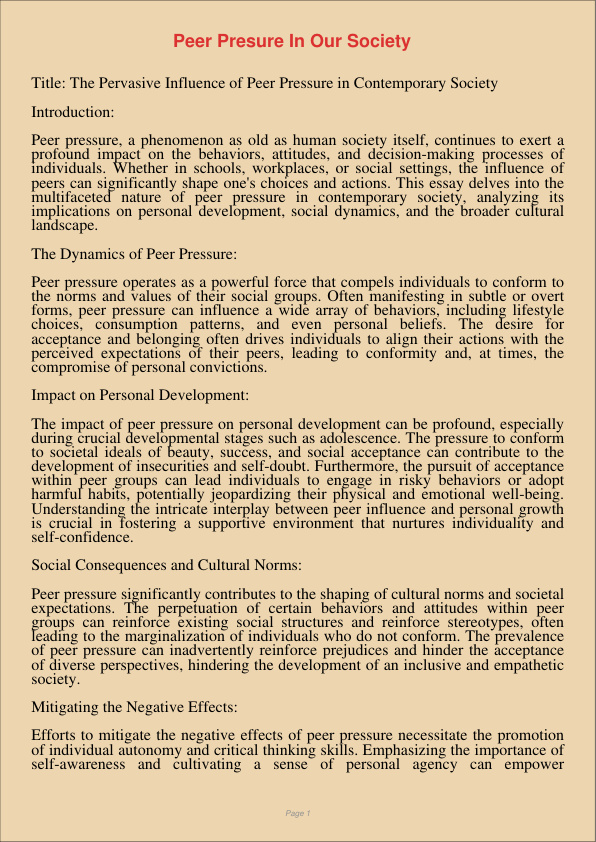Peer Presure In Our Society
Jan 9, 2024
peer presure
society
English
Psychology
Title: The Pervasive Influence of Peer Pressure in Contemporary Society
Introduction:
Peer pressure, a phenomenon as old as human society itself, continues to exert a profound impact on the behaviors, attitudes, and decision-making processes of individuals. Whether in schools, workplaces, or social settings, the influence of peers can significantly shape one’s choices and actions. This essay delves into the multifaceted nature of peer pressure in contemporary society, analyzing its implications on personal development, social dynamics, and the broader cultural landscape.
The Dynamics of Peer Pressure:
Peer pressure operates as a powerful force that compels individuals to conform to the norms and values of their social groups. Often manifesting in subtle or overt forms, peer pressure can influence a wide array of behaviors, including lifestyle choices, consumption patterns, and even personal beliefs. The desire for acceptance and belonging often drives individuals to align their actions with the perceived expectations of their peers, leading to conformity and, at times, the compromise of personal convictions.
Impact on Personal Development:
The impact of peer pressure on personal development can be profound, especially during crucial developmental stages such as adolescence. The pressure to conform to societal ideals of beauty, success, and social acceptance can contribute to the development of insecurities and self-doubt. Furthermore, the pursuit of acceptance within peer groups can lead individuals to engage in risky behaviors or adopt harmful habits, potentially jeopardizing their physical and emotional well-being. Understanding the intricate interplay between peer influence and personal growth is crucial in fostering a supportive environment that nurtures individuality and self-confidence.
Social Consequences and Cultural Norms:
Peer pressure significantly contributes to the shaping of cultural norms and societal expectations. The perpetuation of certain behaviors and attitudes within peer groups can reinforce existing social structures and reinforce stereotypes, often leading to the marginalization of individuals who do not conform. The prevalence of peer pressure can inadvertently reinforce prejudices and hinder the acceptance of diverse perspectives, hindering the development of an inclusive and empathetic society.
Mitigating the Negative Effects:
Efforts to mitigate the negative effects of peer pressure necessitate the promotion of individual autonomy and critical thinking skills. Emphasizing the importance of self-awareness and cultivating a sense of personal agency can empower individuals to make informed decisions and resist undue influence. Encouraging open dialogue and fostering a culture of acceptance and inclusivity can also help create a supportive environment that values diversity and promotes mutual respect.
Cultivating Positive Peer Influence:
While negative peer pressure can yield detrimental outcomes, positive peer influence can foster personal growth and promote constructive behaviors. Building strong, supportive communities that prioritize empathy and mutual encouragement can create a conducive environment for the development of healthy social dynamics and resilient interpersonal relationships. Empowering individuals to serve as positive role models within their social circles can foster a culture of peer support and inspire collective progress and well-being.
Conclusion:
The pervasive influence of peer pressure in contemporary society underscores the need for a nuanced understanding of its dynamics and implications. By fostering a culture of individual empowerment, promoting inclusivity, and nurturing positive peer relationships, we can cultivate a society that celebrates diversity and encourages the development of resilient, confident individuals capable of making informed decisions and contributing positively to their communities. Understanding the complexities of peer pressure is essential in fostering a supportive and inclusive societal framework that values individual autonomy and collective well-being.
